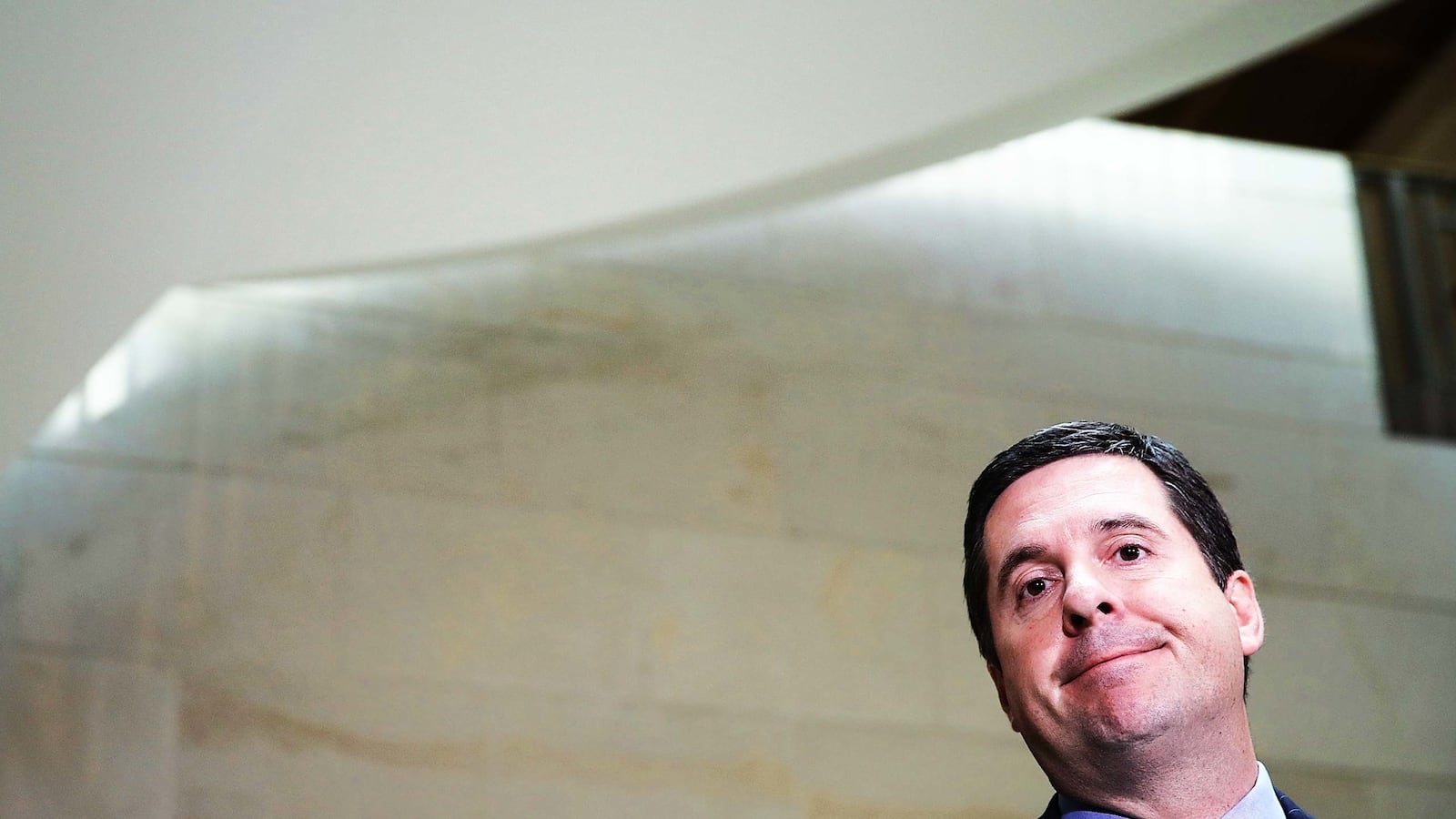In the course of one afternoon, House Intelligence Committee Chairman Devin Nunes steered his panel’s Russia investigation into the troubled lane of the vitriolic, partisan Benghazi special committee.
Most of the lawmakers on the Intelligence Committee, previously known for its leave-your-party-at-the-door work, had held out hope there could be an independent, bipartisan probe into Russian interference in the U.S. elections.
That hope died when their chairman went to the White House, and then the press, to discuss intelligence intercepts involving the "incidental” collection of communications related to Donald Trump and members of his transition team before telling his own committee about the matter.
“If you have a chairman that is interacting with the White House, and sharing information with the White House when people in the White House are subject to investigation… it throws a profound doubt over whether that [investigation] can be done credibly,” said Rep. Adam Schiff, the top Democrat on the panel.
“What was today? It was the chairman of the committee helping the president create the next distraction,” added Democratic Rep. Mike Quigley, a member of the committee. “It was an attempt to be a distraction, sow confusion, create false narratives despite the evidence.”
After Schiff and Nunes finally spoke Wednesday Schiff was asked what assurances he was given that the investigation could be credible and bipartisan.
“I’m not sure at this point we’re likely to get those kinds of assurances,” Schiff said, dryly. In a statement he was more direct, saying that “a credible investigation cannot be conducted this way,” referring to the decision by Nunes’ decision to brief the White House first, and then to fill in the press before his own committee, as a “profound irregularity.”
The House Intelligence Committee’s primary responsibility is to oversee the executive branch—not to loop them in on active investigations.
“The chairman of the intelligence oversight committee is part of a separate branch of government, and the president and president’s campaign officials are potential subjects of investigation,” said Bradley Moss, a national security lawyer. “When [Nunes] reviewed the intercepts, that he has stated reflect incidental collection of communications from the president, or the president’s associations… He doesn’t use it as part of the committee’s investigation, but runs to the White House, which is a subject of the investigations.”
So within hours, the plausibility of the House Intelligence Committee conducting an independent inquiry plummeted.
“The chairman will need to decide whether he is the chairman of an independent investigation into conduct which includes allegations of potential coordination between the Trump campaign and the Russians, or if he is going to act as a surrogate of the White House, because he cannot do both,” Schiff said. “And unfortunately the actions of today throw great doubt into the ability of both the chairman and the committee to conduct it the way it ought to be conducted.”
Schiff had been a member of the Benghazi Committee, which spent two and a half years to investigate the deaths of Americans in Libya, and disbanded shortly after Clinton lost the presidential election.
“I’ve been part of investigations were conducted properly… and I’ve been part of investigations that were not, such as the Benghazi Select Committee,” Schiff said Wednesday afternoon. “It’s still my hope that this investigation should be conducted properly, but unfortunately the actions of the chair throw that very much in doubt.”
But much like the Democrats on the Benghazi Committee, the party’s Intelligence Committee members say they remain committed to continued participation in the investigation, even as it turns partisan.
“The Democrats would not, should not walk away from the investigation. It would just turn the lights out. There is too much to learn. At the very least we are shining light on this as this moves forward,” Quigley said.
Wednesday’s disarray comes after a partisan and fractured open committee hearing on Monday, in which panel members grilled FBI Director James Comey and NSA Director Mike Rogers. Each side weaved their own realities: Republicans hammered on leaks, while Democrats wildly cited name after name of Trump associates, hoping to catch a lead.
At one point Nunes went so far as to ask his witnesses whether the Russian government typically prefers Republicans or Democrats. Observers got lost in the web of names and ties and banks and Russians posed by Democratic questioners.
Even before Wednesday’s actions, Nunes’ independence could be fairly brought into question.
He served on the Trump transition team. He has told reporters he didn’t think Russia wanted Trump to win the election, contradicting the intelligence community’s assessment of Russia’s intentions. And he’s called a reporter on the White House’s behalf regarding ties between Russia and Trump associates, a violation of the firewall that should exist between investigators and those being investigated.
On Wednesday, after a tense press conference in which he questioned whether the investigation could even continue under these circumstances, Schiff hinted that the investigation was beginning to unearth real evidence of collusion.
As he left the press conference, he told The Daily Beast that he has begun to see that “more than circumstantial” evidence of collusion between the Russian government and the Trump campaign.





